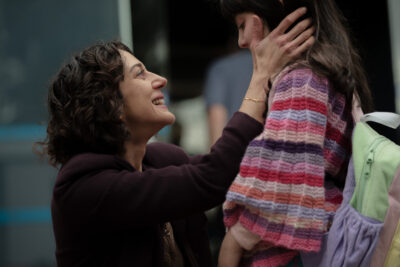Shayda, an subtle, potent story of female empowerment, establishes first-time feature filmmaker Noora Niasari as a remarkably assured talent. She won an Audience Award and was nominated for a Grand Jury Prize last year at Sundance and received a nomination from the DGA for achievements by first-time filmmakers. Film critic Claudia Puig described the film on LAist’s FilmWeek as “one of the most masterful debuts of a filmmaker that I’ve seen in a long time.” We open the film this Friday at the Royal and expand March 8 to the Town Center and March 15 to the Laemmle Glendale.
From a piece about Shayda last year in The Guardian:
When Noora Niasari was five years old, she lived in a women’s shelter with her Iranian mother. They were fleeing family violence in a country that wasn’t entirely familiar, trying to make a new life.
That personal experience has informed Niasari’s debut feature, Shayda, which has been storming the global festival circuit since it premiered at Sundance film festival in January, winning an audience award. Released in Australia on 5 October, the film has already claimed the top prize at CinefestOz, opened the Melbourne international film festival, and been selected to represent Australia in the international film category at the Oscars.

It’s a sensational reception for a first film, particularly given the specificity of its story: Shayda is a dramatisation of Niasari’s early life, set in the Iranian diaspora community of suburban Melbourne. “It was something I had experienced, but I hadn’t really seen on screen before,” Niasari says of the movie she started thinking about straight after finishing film school. “But I first had to ask my mum for her permission and participation, because I had such a blurry memory of that time.”
Niasari asked her mother to write her memoirs, which took six months; that writing formed the basis of the first incarnation of Shayda’s script. Shayda evolved over time – and it’s not always a direct mirror of what happened to them both – but “it is very emotionally true to our experience”.
Executive produced by Cate Blanchett, Niasari’s movie tells the story of Shayda (Zar Amir Ebrahimi), an Iranian immigrant in Melbourne who leaves her abusive husband Hossein (Osamah Sami) with her daughter Mona (Selina Zahednia) in tow. Shayda finds refuge in a women’s shelter where the kindly Joyce (Leah Purcell) protects and guides her through the tough legal process of a custody fight.
It’s a tender and revealing film that balances Shayda’s discovery of inner strength with the sacrifices she makes for her daughter, as she tries to create a new family for her. It’s understated, relatable and drawn from such personal memories that Niasara describes working on it as “long-term exposure therapy”. Even doing interviews to promote the movie is difficult. “I have to sit with it and process it,” she says.
“But the thing is, now that it’s a film, it has a really different energy in the world. People bring their own experiences to it, it’s a very universal experience. We’ve screened it in Europe, North America and Australia and there is a real sense that it connects beyond my mother and I, beyond our experience. It’s not about us any more. That feels liberating and cathartic.”
Read the rest of The Guardian piece here.
